

|
|
Table of Contents: Cover Page Dedication Introduction "America" "Christmas Hymn" "Lines on the Death of J. Quincy Adams" "To Cinque" "New Year's Hymn" "To A.H." "Love" "How Long" "The Arch Apostate" "The Misanthropist" "A Hymn" "Yes! strike again that sounding string" "To -------" "Prayer of the Oppressed" "To S.A.T." "Delusive Hope" "To M.E.A." "A Hymn" "Self-Reliance" "Ode for the Fourth of July" "Midnight Musings" "Ode to Music" "Stanzas for the First of August" "The North Star" (text of all poems) |
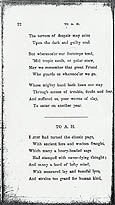
|
I JUST had turned the classic page, With ancient lore and wisdom fraught, Which many a hoary-headed sage Had stamped with never-dying thought; And many a bard of lofty mind, With measured lay and tuneful lyre, And strains too grand for human kind, |
||
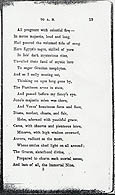
|
All pregnant with celestial fire --- In notes majestic, loud and long, Had poured the volumed tide of song. Here Egypt’s sages, skilled of yore In Isis’ dark mysterious rites, Unvailed their fund of mystic lore To eager Grecian neophytes. And as I sadly musing sat, Thinking on ages long gone by, The Pantheon arose in state, And passed before my fancy’s eye. Juno’s majestic mien was there, And Venus’ beauteous form and face, Diana, modest, chaste, and fair, Hebe, adorned with youthful grace, Ceres, with sheaves and plenteous horn, Minerva, with high wisdom crowned, Aurora, radiant as the morn, Whose smiles shed light on all around; The Graces, sisterhood divine, Prepared to charm each mortal sense, And last of all, the immortal Nine, |
|||
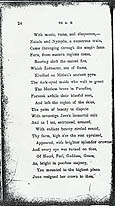
|
With music, verse, and eloquence, --- Naiads and Nymphs, a numerous train, Came thronging through the ample fane. Peris, from eastern regions came, Bearing aloft the sacred fire, Which Zoroaster, son of flame, Kindled on Mithra’s ancient pyre. The dark-eyed maids who wait to greet The Moslem brave in Paradise, Forsook awhile their blissful seat, And left the region of the skies, The palm of beauty to dispute With sovereign Jove’s immortal suit. And as I sat, entranced, amazed, With radiant beauty circled round, They form, high o’er the rest upraised, Appeared, with brighter splendor crowned And every eye was turned on thee, Of Houri, Peri, Goddess, Grace, As, bright in peerless majesty, You mounted to the highest place. Juno resigned her crown to thee, |
|||
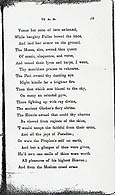
|
Venus her zone of love unbound, While haughty Pallas bowed the knee, And laid her armor on the ground. The Muses, also, owned thee queen Of music, eloquence, and verse, And tuned their lyres and harps, I ween, Thy matchless praises to rehearse. The Peri owned thy dazzling eye Might kindle far a brighter fire Than that which erst blazed to the sky, On many an oriental pyre, There lighting up with ray divine, The ancient Gheber’s fiery shrine. The Houris owned that could they charms Be viewed from regions of the skies, ‘T would tempt the faithful from their arms, And all the joys of Paradise; Or were the Prophet’s self on earth, And but a glimpse of thee were given, He’d own one smile of thine were worth All pleasures of his highest Heaven; And from the Moslem creed erase |
|||
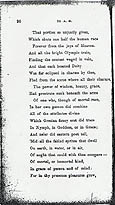
|
That portion so unjustly given, Which shuts one half the human race Forever from the joys of Heaven. And all the bright Olympic train, Finding the contest waged in vain, And that each boasted Deity Was far eclipsed in charms by thee, Fled from the scene where all their charms, The power of wisdom, beauty, grace, Had prostrate sunk beneath the arms Of one who, though of mortal race, In her own person did combine All of the attributes divine Which Grecian fancy erst did trace In Nymph, in Goddess, or in Grace; And ne’er did eastern poet tell, ‘Mid all the fabled sprites that dwell On earth, in water, or in air, Of aught that could with thee compare --- Of mortal, or immortal kind, In grace of person and of mind: For in thy presence pleasures grow, |
|||
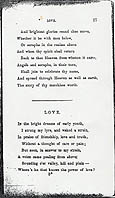
|
And brightest glories round thee move, Whether it be with men below, Or seraphs in the realms above And when thy spirit shall return Back to that Heaven from whence it came, Angels and seraphs, in their turn, Shall join to celebrate thy name, And spread through Heaven as well as earth, The story of thy matchless worth.
|
|||